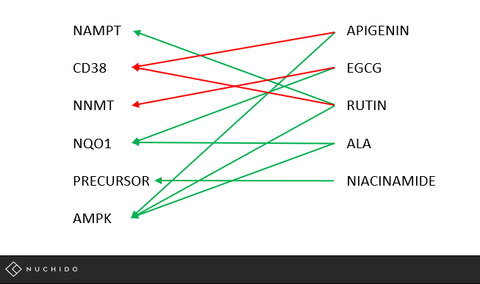I've decided to start just taking Apigenin for this instead of the other supplements which tend to be prohibitively expensive.
My understanding based on various studies is that CD38 would be a great target to increase nad+ since it is generally understood that it's increased activation with age is one of or the main reason for the decline of nad+ with age. For the record, quercetin is also known to inhibit CD38.
Does anyone else share this view or think it's reasonable? If not, why not? As with everything we do here, timing plays a factor. Maybe in 5-10 years NMN will come down in price, but for now what's the point since a normal person can only purchase it very sporadically, especially if they use other supplements.
Apigenin is also known to be anti-cancer through other pathways, so in a sense it could be the best of both worlds.
Having said all this, I take it regularly and have not experienced anything all that noticeable. Whereas, NMN does seem to have an effect for me, whether placebo or not I can't say. Neither of them have any effect on the targets I most care about as far as I can tell.
lots of studies out there on this, but here's a very interesting blurb from a recent study (review) authored by the master himself (Sinclair)
https://www.cell.com...KExSscneyb4VOFc
CD38 is a major consumer of NAD+ in mammals. Evidence for this includes the observations that mice lacking CD38 or treated with the CD38 inhibitor apigenin have about 50% more NAD+ and that CD38 protein levels increase in various tissues during aging with a concurrent drop in NAD+ levels. By 32 months of age, wild-type mice have about half the NAD+ levels of young mice, whereas CD38 knockout mice maintain their NAD+ levels and are resistant to the negative effects of a high-fat diet (HFD), including liver steatosis and glucose intolerance,. Conversely, mice overexpressing CD38 have lower levels of NAD+, defective mitochondria, decreased oxygen consumption, and increased lactate production . Inhibitors of CD38, such as apigenin and 78c), are proof-of-concept molecules for the development of drugs to treat metabolic disorders and possibly other age-related diseases
I read about 78C a while back, a hilariously expensive and hard to access pharma creation that inhibits CD38. The only thing I can think of is that maybe it's a bio-availability issue for apigenin? If not that, then it's clearly the correct choice.
































 This topic is locked
This topic is locked















